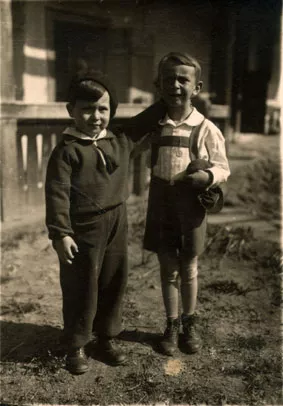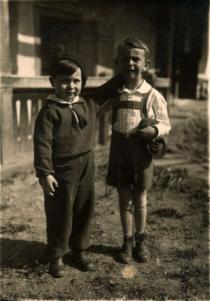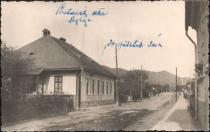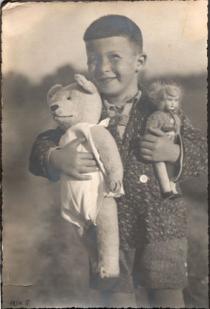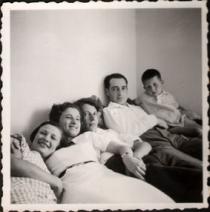It is me [Janos Gottlieb] on the left, on the right is Puiu Ciortea. He’s Romanian. I didn’t care if someone was Romanian or Hungarian or Jewish.
His father was a doctor, he was our neighbor in Nagybanya. The photo was taken by my father [Laszlo Gottlieb] in the first part of the 1930s in Nagybanya.
I was born in 1929 in Nagybanya. I had a very beautiful childhood.
The environment and the people were all very nice. God knows how it worked back then, but I did have all kind of friends: Jews - but just a few -, Hungarians, Romanians.
We got along well with everybody, we mixed with everybody; nationality or religious affiliation didn't mean a problem. Nationality and religion was everyone's own business.
Especially after I learnt Romanian at the age of six, being in contact with Romanian children didn't have any obstacles.
I was very distressed when I saw they were instigating people of different nationality against each other - for this is the truth.
I experienced incitement in my childhood already. There were Hungarians, who were against Romanians, and Romanians, who didn't like Hungarians.
I don't know why, because one can not be against one nation. You can be against a person, yes, but not against a nation.
That's it. And anti-Semitism started to be present in the 1940s, I was already eleven years old.
I had Hungarian friends, I even had friends who came to Nagybanya from Hungary, when North-Transylvania belonged to Hungary, and I got along well with them too, there wasn't any problem.
I couldn't say they were anti-Semite. However, there were people who always talked badly of Jews.
For example it was the manifestation of anti-Semitism, that after the Germans came in - this was already in 1944 -, we had to wear yellow stars.
Then they gathered us into ghettos. Now who took us into the ghettos? The Hungarians. What can I say?
To every Jewish home a commission of few persons came, and they said: pick up a few things within a few minutes, and we'll take you to the ghetto. Without any further explanations.
They were civilians, I don't think they had guns, they didn't need any. For example one of the civilians who came to us was my gym teacher.
